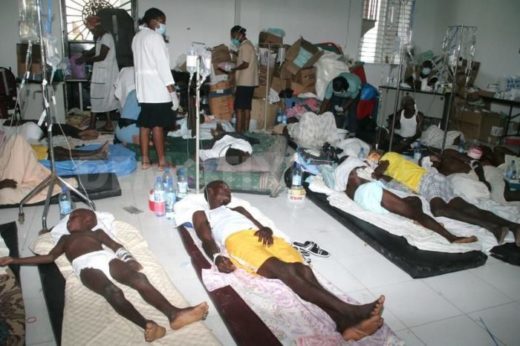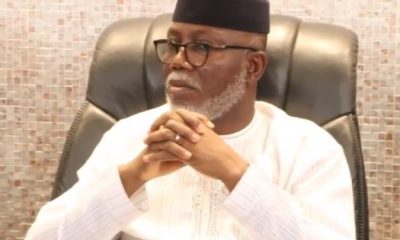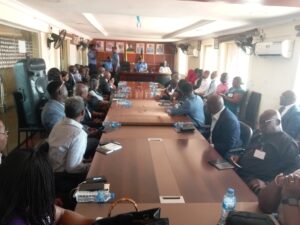Health
How we are Able to Reduce Medical Tourism – MD Alliance Hospt.

By Laide Akinboade, Abuja
The Medical Director, Alliance Hospital, Dr. Christopher Otabor, has revealed the efforts his hospital is making in order to reduce over $1 billion lost to medical tourism annually.
Otabor, revealed this when guild of medical Directors, led by
Dr Kingsley Iseko, paid him a solidarity visit in Abuja.
The Guild of Medical Directors who commended Dr.
Otabor over his commitment to reverse medical tourism in NigeriaThe Chairman, Guild of Medical Directors, FCT chapter Dr Kingsley Iseko who led the delegation to Alliance Hospital said the guild is solidly behind the hospital, especially with the ways it is saving lives through its quality health services
Iseko commended Alliance Hospital for engaging in various humanitarian services, adding that all members of the Guild are open to regulations.
“We are open to regulations because it helps us set standards and to make sure that people have confidence in the health care that is being given.
“Abuja is fast becoming the centre of reversing medical tourism. Hospitals that are in the guild of medical directors have also spearheaded that,” he said.
In his response, the MD of Alliance Hospital Dr. Christopher Otabor explained the economic effect of medical tourism and the attendant brain drain saying that for the country to reverse the two unpleasant situations government needs to invest more in hospital equipment, motivate health workers, and tackle insecurity.
He said kidney issues is the leading cause of people that travels abroad for treatment.
He also identified lack of latest equipment, no strategic investment, lack of capacity building as some of the reasons why qualified medical personnel are leaving Nigeria to seek better opportunities abroad.
According to Otabor, “It is estimated that over a billion dollars is lost to medical tourism annually from this country.
Of course, anyone that has the money will want the best for himself and there’s no law that says you cannot travel to take care of yourself.
“There are some specialties that normally attract people abroad, like Joint replacement auto pedics, Joint replacement surgeries, Cardiac surgeries, Kidney transplant among others.
“Kidney transplant is a leading discuss now because the rate of end state kidney failure in the country is alarming. Every time you tune your television to stations that into corporate social responsibilities, that tend to announce some of these cases for people to contribute, there’s hardly any day you’ll not find 10 cases of kidney failure being announced.
“I can tell you here that there’s hardly anybody here who has not been affected in one way or the other. Either a relative of yours have suffered from kidney failure and has died or probably had a transplant, or a church member or a member of your Muslim community or a colleague in the office, somehow we are affected.
“This is because the cases are increasing. Unfortunately, it’s such a big deal that not too many people can go abroad for it, because it requires a huge amount of resources.
“For you to do a kidney transplant in the United Kingdom now, you need about 100,000 pounds. That’s about 180 million naira. In India, you’d probably be requiring like 80 million there. Not too many families can afford that.
‘That’s why we are trying to build capacity locally We’re trying to see how we can bridge the gap. But of course, when you are going into a novel area, there will be challenges and I see the challenges that we have today as a teething problem that will go away”.
Why is Nigeria battling with braindrain, he lamented, “If you are not going to treat your healthcare professionals very well, if they have the next opportunity, they are going to leave.
“You can treat the healthcare professionals well by investing in the healthcare system. There are strategic investments.
“When somebody qualified after spending six years as a medical doctor and spent another six years or five years in the postgraduate program, his top priority can never be money. Good salary is one of the motivating factors for doctors to stay back, but I can shock you that is not necessarily the best. It’s not the top.
“There’s nothing that gratifies a doctor more than when he’s able to save the lives that he was trained to save, which means first of all, you have to have the equipment to save those lives.
“When you are in the hospital and you are confronted with, let’s say, a patient is bleeding and you don’t have the equipment to stop the bleeding. There are different types of bleeding somewhere within some outside.
“If a patient is bleeding and you don’t have the equipment to stop his bleeding and then you watch that patient bleed until he or she bleeds to death. Not because you don’t know what to do, but because you don’t have the equipment. Throughout that week, you will never be the same. It will take a lot of guts and courage for you to come back to yourself, because you see yourself as a failure.
“But when you see a patient bleeding, let’s say, internal bleeding and within a few minutes, you’ve stopped the bleeding and you deliver the patient out alive. That feeling is irreplaceable. Money cannot even replace that feeling.
“That is one of the main reasons why Nigerian doctors are leaving. Because most of our hospitals are not equipped. So, they don’t have fulfillment”.
Meanwhile, in the same day, Dr. Otabor, was also presented with an award by the Ochekwu Morgan, National Coordinator, Nigerian Patriotic Youth against Corruption and Transparency Initiative.
According to Morgan the leader of the youth group, “We want to assure you sir that the Nigerian Patriotic Youth against Corruption and Transparency Initiative are strongly in support of you and your activities and shall always stand by you.
“Having on the first note, seen you as one of the few remaining Leaders whom has found satisfaction in human and youth development, you have distinguished yourself from others by setting a pace for excellence”.
Health
300 Child Cancer Cases Recorded in LUTH

Dr Abidemi Omonisi, Consultant Pathologist, revealed that Lagos University Teaching Hospital (LUTH) recorded 300 child cancer cases in one year.
Omonisi made this statement on Tuesday in Abuja at the in-country mission Programme Action for Cancer Therapy (imPACT) review.
imPACT, a division of the International Atomic Energy Agency (IAEA), assesses countries’ cancer control capabilities, identifies challenges, and informs them of gaps to aid future cancer control plans and implementation.
According to Omonisi, the recorded cases indicate an increase in childhood cancers in Nigeria, warranting prominence and attention.
As former Acting Director of the National System of Cancer Registry at the National Institute for Cancer Research and Treatment (NICRAT), Omonisi noted that focus had primarily been on breast, cervical, and prostate cancers.
“However, our registry data shows that children also suffer from cancer, including inherited cases.
“During my consultancy visit to LUTH, we discovered a changing trend.
“Previously dominant Burkitt lymphoma has given way to methodological malignancy, specifically leukemia.”
Omonisi said that the LUTH registry would serve as Nigeria’s first population-based childhood cancer registry, providing robust data for analysis.
He further said that by December, the collected data would be analysed, and findings would inform policy suggestions to the government.
Omonisi said the aim was to duplicate the childhood cancer registry in all six geopolitical zones.
Laura Haskins from the International Atomic Energy Agency (IAEA) stated that the review, requested by the Federal Government, aimed to analyse Nigeria’s cancer control capacities and needs.
“The IAEA, WHO, and IARC provide technical support to countries strengthening their cancer control.
“We acknowledge Nigeria’s existing capacity and seek to tailor our assessment to its specific needs.”
Prof. Musa Ali-Gombe, Director of Clinical Services at NICRAT, explained that the meeting’s objective was to engage stakeholders in Abuja and nationwide on their roles, challenges, and gaps in cancer control activities.
“Participants include academic institutions, medical professional associations, NGOs, and CSOs involved in cancer advocacy.
“This collaboration will produce a comprehensive document for the government to implement suggested improvements.”(NAN)
Health
Ebonyi Records 28 Cholera Deaths, 386 Cases

The Commissioner for Health, Dr Moses Ekuma, has disclosed that the state has recorded 28 deaths and 386 cases since the cholera outbreak on September 24.
Ekuma made this known to newsmen on Saturday during the donation of medical commodities by the Governor’s wife, Mrs Mary-Maudline Nwifuru, to the General Hospital in Iboko, Izzi Local Government Area.
Ekuma said most deaths occurred at home before the emergency response team and the ministry were informed.
He attributed cholera outbreaks to contaminated water, poor sanitation, and improper disposal of refuse, among other factors.
To tackle the outbreak, he said about six treatment centres have been designated across the state.
He said the governor’s wife’s donation, made through her pet project, Better Health for Rural Women, Children and Internally Displaced Foundation (BERWO), included home purification tablets, hand sanitisers, intravenous infusion, and oral rehydration salt.
Ekuma commended the governor’s efforts against the epidemic.
Mrs Nwifuru, while making the donation, commiserated with families of the victims and encouraged them not to lose hope.
She noted that the visit aimed to identify factors contributing to the spread of the disease.
“The sight of these people battling cholera is a reminder that we must do more to protect our communities from infectious diseases,” she said.
Daniel Hernandis, Project Medical Referral of Doctors-without-Borders, decried the outbreak’s level, stating that over half of the cases were recorded in Izzi Local Government Area.
Hernandis appreciated the support from the World Health Organisation and healthcare workers on the frontlines.(NAN)
Health
Only 17% of SDG Healthcare Targets are on Track – WHO

By Laide Akinboade, Abuja
World Health Organization (WHO) Country Representative to Nigeria, Dr. Walter Kazadi Mulombo, at the weekend revealed that only 17% of the Sustainable Development Goals, SDG, healthcare targets are on track, while the rest are at serious risk.
Mulombo stated this in Abuja, while addressing journalists at the two-day capacity training organised by WHO.
He said it is imperative for the Federal Government, FG, to accelerate its healthcare reform in order to meet the SDGs.
Dr. Mulombo stressed that Nigeria must move beyond pilot projects and focus on delivering large-scale, quality healthcare solutions.
He added that the key word is ‘acceleeation’ “If we continue in the pace at which we are going,been might not reach there.
There might be prospects of extension but we should not look at that . We are therefore urging Nigeria to accelerate”.According to WHO boss, “It’s time for implementation, quality, scale, and speed,” he said, urging for collective efforts from the government and communities to overcome challenges.
Dr. Mulombo said it is very worrisome that Nigeria rank 187th out of 191 countries in healthcare performance. He pointed to factors such as inadequate funding, poorly trained healthcare personnel, and high costs of services as barriers that need immediate attention.
Journalists, he said, have a pivotal role in driving change by ensuring that the public receives accurate, evidence-based health information, especially in remote areas. “Journalists are the bridge between the public and the facts, and it is crucial that this bridge is built on the foundation of truth and responsibility,” Dr. Mulombo noted.
Given Nigeria’s prominence, representing nearly a third of Africa’s population, Dr. Mulombo emphasized that responsible reporting can shape both national and international perspectives on the He called on journalists to collaborate closely with healthcare experts to ensure accurate information reaches the public, especially in light of global challenges like COVID-19, climate change, and economic downturns.
The WHO representative reaffirmed WHO’s support for Nigerian journalists, praising their resilience and encouraging them to maintain ethical and evidence-based reporting as Nigeria navigates its healthcare challenges.
Meanwhile, WHO also revealed that about 28 million Nigerians would have to relocate due to rise in sea level.
Dr. Edwin Eden, stated this in a paper titled ‘Interconnection between Climate change and public health’, at the conference.
He said, “29% of Nigeria national disease burden is linked to risks factors from the environment. Over 21% anticipated burden of disease in Nigeria due to Climate change. 3.371 Carbon dioxide, emission, CO2e, Nigeria’s greenhouse gases (GHG), emission per capita.
“442.5 MICO2e, 2030 Nigeria New Distribution Capability, NDC, target . 94% Health facilities, do not have basic water sanitation and hygiene services.
“27.53 million people in Nigeria might need to be relocated with a 0.5 meter increase in sea levels. 3.6 billion people already live in areas highly susceptible to climate change. The direct damage cost to health is between US$ 2 – 4 billion per year by 2030. Approximately 250, 000 additional deaths annually due to climate Change”.
Edwin, while mentioning those things use or done in the environment that are directly or indirectly affecting climate Change and health of people, these are chemicals and pesticides in food chains, open defaecation, oil and gas pollution,drinking-water, sanitation and hygiene (WASH), and vector-borne out breaks, and poor solid waste management.
“Climate change impact on health, include, flooding, air pollution, plastics in the oceans, and electronic waste”.
Nigeria is 3rd in Africa, whose children are most vulnerable to Climate related risks and hazards, especially associated with environmental risks.
Central African Republic, CAR comes first while Chad comes second and Nigeria’ followed, according to WHO’s, Children’s Climate Risk Index, CCRI, ranking.
On Primary Health Centers, PHCs, Dr. Brantuo Mary Ama, in her paper presentation titled ‘PHCs as a tool for Health Systems Strengthening and high quality healthcare services for all’, she said over 1 billion people worldwide are at risk of falling into poverty because of our of pocket health spending of 10% or more of their household budget.
She said, “Over 1 billion people worldwide are at risk of falling into poverty due to our of pocket health spending of 10 or more of their household budget.scaling up PHC intervention across low and middle income countries could save 60 million lives and increase average life expectancy by 3.7 years by 2030.
“The majority of essential interventions (90%), for Universal Health Coverage, UHC can be delivered through PHC approach. An estimated 75% of the projected health gains from SDGs could be achieved through PHC. PHC is crucial to fast tracking Nigeria’s health and development targets . The opportune time is now as the President’s renewed hope agenda has been set high standards of expectations that need to be delivered.
“By 2030 at least 80% of member states health systems that are performing optimally for effective delivery of essential package of health and related services.
“All members states will have at least 80% of their population utilizing the identified essential package of health related services. All member states will have in place and be implementing the investment plans needed to align their health system to the SDGs”.!




















